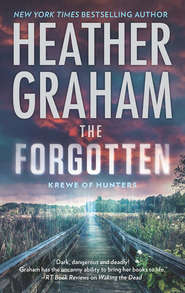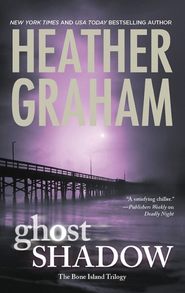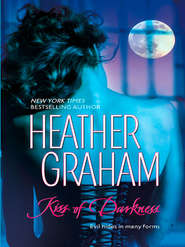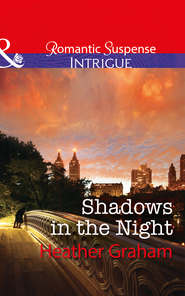По всем вопросам обращайтесь на: info@litportal.ru
(©) 2003-2024.
✖
The Séance
Автор
Год написания книги
2018
Настройки чтения
Размер шрифта
Высота строк
Поля
Martin grunted and turned the tape recorder back on. Jerry gave Jed a glance, shrugging. He’d warned Jed that they might have trouble. He’d told him right out that if Martin said he had to leave, he had to leave.
An autopsy was a long, hard business, and Jed knew it. In his five years in Homicide, he’d learned too well just how much had to be done meticulously and tediously. And messily.
He’d never expected to attend one when his presence wasn’t necessary in solving a case, but the truth was, he didn’t have to be here today.
Except in his own mind.
The woman on the table was already out of her body bag. There had been no need to inspect her clothing. She hadn’t been found with any.
The discovery of her body on the I-4 had been not just a tragedy but a shock to the police and anyone who had been in the area for the original killings twelve years ago. Her name was Sherri Mason; she had come to what the locals called Theme Park Central in the middle of the Florida peninsula because she’d wanted to be a star. The police knew her identity because her purse—holding not just her ID but fifty-five dollars and change and several credit cards—had been found discarded near her naked body.
She had been found not just lying there but carefully displayed, arranged, stretched out on her back as if she were sleeping, her arms crossed over her chest, mummy-style. They were assuming, an assumption to be verified during the autopsy, that she had been sexually assaulted.
Just like the other five victims—those who’d been slain twelve years ago.
The problem was, everyone had spent the past twelve years assuming that the killer of those five young women—found beside the same highway and left in the exact same position—had perished himself. He had been a cop named Beau Kidd, shot by his own partner, who had discovered him with the body of the fifth woman. Beau had drawn his own weapon, giving his partner no choice but to fire. He’d never gone to trial, since he’d been pronounced dead at the site, exhaling his last breath over the body of his final victim.
Assuming he really had been the killer. Certainly the remaining detectives working the case and the D.A.’s office had thought so, and there had been enough circumstantial evidence to make the case.
That evidence had been sound, Jed knew. He had investigated the case himself after he left the force. He had interviewed as many people who’d been involved as he could find. His first book, the one that had made his reputation as an author, had been about the case. A work of fiction, names changed, but it had been clearly based on the career of the Interstate Killer.
Like everyone else, he’d unquestioningly blamed the deaths on the man who had died, one of the detectives assigned to the case.
Jed put the past and all his doubts out of his mind as Doc Martin went on to make observations and take photographs. The body showed signs of rough handling, with abundant bruising. As expected, she had been sexually assaulted, but, as in the past, the killer had been careful. More testing would be necessary, but every one of them was glumly certain there would be no fluids found from which to extract DNA.
The majority of the bruising was around her neck. Like the original victims, she’d been strangled.
Occasionally the M.E. had a question for Jerry, who explained that Sherri had last been seen at a local mall, and that her car had been found in the parking lot there. She had met friends to see a movie, then left alone. When she hadn’t shown up for work the following day, a co-worker had reported her missing and filed the report when the requisite twenty-four hours had passed. On the third day after her disappearance, she had been found alongside the highway.
Jed realized that Jerry was staring at him. “The same?” he inquired.
“I didn’t attend any of the original autopsies, remember?” Jed replied.
“You did the research,” Jerry reminded him.
Jed hesitated, shook his head grimly, and spoke. “The previous victims disappeared and were discovered within a few days. They bore bruises, as if they’d fought with their captor. There were signs of force, but no slashes, no cigarette burns or anything like that. No DNA was ever pulled from beneath fingernails, and no DNA was acquired from the rape kits. That was one of the reasons for thinking the killer was a cop. Whoever killed those girls knew how to commit a murder without leaving evidence.”
“None of you were on the case, or even near it?” Doc Martin asked, looking up.
Both men shook their heads.
“I wasn’t here, either, at the time. I was working Broward County back then,” Doc Martin murmured. “Hell, come to think of it, Jed, you weren’t much more than a kid at the time.”
“Eighteen, and in the service,” Jed told him.
Doc Martin settled down to work then. After the back of the body had been inspected, it was bathed and any trace evidence collected in the drain. Tools clicked against the stainless steel of the autopsy table. Scrapings were taken from beneath Sherri’s nails, but Jed was already certain that they would find nothing. Next came the scalpel, the Y incision, the removal of organs and fluids for testing. Everyone went quiet. Jed found himself thinking about Sherri’s dreams. She had come to Orlando looking for a start. To create a résumé to take with her to New York or California. With all the theme parks in the area, she’d had a solid chance of finding work as a dancer or singer.
So who had she met, what had she done, that had changed the shimmering promise of life that had stretched before her?
“Well, Doc?” Jerry asked quietly. Jed gazed at his old friend. Jerry had been on the force for several years before he’d joined himself. He, too, had spent his fair share of time in the autopsy room. But today…This death had affected them all. She’d been so young. Death was part of living. But losing life at a time when dreams were at their strongest was especially poignant.
Doc Martin looked at them, shaking his head sadly. “The tox screens will take a little time, but I’m not expecting they’ll turn up anything. The kid was clean. Dancer, I imagine, hoping to grow up to be a fairy princess. Cause of death? Strangulation. Was she tortured before death? Hell, yes—I’d sure call it torture to be continually assaulted, knowing that death is probably imminent. The bruising appears to be indicative of her having been forced and the fact that she fought. We’ll analyze the nail scrapings, of course, but—”
“But if her murder was committed by the Interstate Killer,” Jed said dully, “there won’t be any DNA beneath the nails. And there won’t be any semen in the vaginal canal.”
“Just like twelve years ago, like a cop or an M.E. or a crime scene tech, someone who knew exactly what would nail him, did it,” Jerry said.
“Or an avid student of forensics?” Jed said.
Doc Martin was thoughtful for a moment. “No way to know for sure, but it’s certainly possible.”
A few minutes later they were standing outside the morgue. The sun was high and hot, the sky the kind of crystal blue the state was known for. But the storm clouds were already brewing. Hell, it was summer. That meant a storm like nobody’s business sometime during the day, around three or four, usually. Locals loved the phenomenon, though the tourists had a penchant for running from the theme parks when the rains started, not realizing they would be gone in an hour or so.
Then the night would be beautiful, crystal clear, even if humid and hot.
“Well?” Jerry demanded, staring at Jed.
“Well, either everyone involved fucked up entirely and Beau Kidd wasn’t the killer, or we’ve got a copycat out there who studied the case and is imitating the original too damn well.”
“Hell, I knew that.”
“Jerry, I was in and out of town when it all went down,” Jed reminded his friend. “And I wasn’t on the force then, either. Who’s your partner these days?”
“O’Donnell. Mal O’Donnell. And he wasn’t around twelve years ago, either. Hey, you want to get some dinner?”
Dinner? Jed’s stomach turned at the thought. Did that make him a wimp? he wondered. He could still smell death and disinfectant. Still, he started to agree, hoping, probably vainly, that Jerry might say something that would give him a clue to the truth about the murders. Did he feel guilty? Hell, yes—if he’d made a mistake. Not only had he made the perp in his novel the homicide cop, even though the man’s name had been changed for legal reasons, but the case he had used was glaringly evident.
The real cop was dead.
Yeah, but his parents weren’t. And they had to live every day with the world’s belief in their son’s guilt, a belief he had perpetuated in his novel.
Jed realized that he wanted the current killing to be the work of a copycat—he didn’t want to be responsible for the continued life of a horrible mistake.
“Hey, you in there somewhere?” Jerry asked him.
“Yeah, sorry.” Jed looked at his watch. “I can’t join you for dinner. I have a commitment.”
“Yeah?”
“My cousin Ana. One of her best friends when she was growing up just moved into her grandmother’s house. I promised I’d show up for the housewarming.”
“Cool. Where’s the house?”
“Almost horse country. An old pre-Civil War place, one of the few still left in the area.”
“Ah. A rich kid.”
“No, not really. I grew up down the street, and Ana is still there, since she bought her parents’ house. Christina’s place is just older and bigger. Her grandparents were immigrants and bought the place way before the theme park explosion, when the countryside was nothing but groves.”











